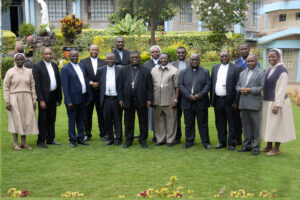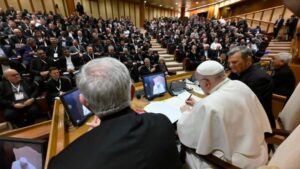VATICAN: On World Water Day, Vatican Calls for Crucial Act to Improve Water Access and to End Waste

World Water Day, Credit; Courtesy photo
Sr. Jecinter Antoinette Okoth, FSSA
On the occasion to mark the 28th World Water Day on Monday, March 22, Vatican official has urged for quick action to help improve access to clean water, reminding the people to avoid wastage but rather use the commodity responsibly for the good of all.
In a video message on behalf of the Holy Father, the Secretary of State Pietro Cardinal Parolin observed that amidst the technological advancements in the 21st century “access to safe, drinkable water is not within everyone’s reach.”
During his address to the Director-General of the United Nations Food and Agriculture Organization (FAO) Mr. Qu Dongyu, the Director General of United Nations Educational, Scientific and Cultural organization (UNESCO) Ms. Audrey Azoulay and the online participants Cardinal Parolin said, “In order to guarantee fair access to water, it is vital to act without delay, to put an end once and for all to its waste, commodification and contamination.”
The Vatican Secretary of State continued, “Collaboration between states, the public and private sectors, as well as an increase in initiatives by intergovernmental bodies, is more necessary than ever. There is also an urgent need for binding legal coverage and systematic and effective support to ensure that drinking water reaches all parts of the world in adequate quantity and quality.”
Cardinal Parolin pointed out that already in his Encyclical Letter Laudato Si’ the Holy Father noted that water is “a basic and universal human right … a condition for the exercise of other human rights,” which every human being needs access to “so that they can lead a dignified life.”
He further disclosed that “our world has a grave social debt towards the poor who lack access to drinking water, because they are denied the right to a life consistent with their inalienable dignity.”
The World Water Day initiative is part of the 17 Sustainable Development Goals (SDGs) anticipated to be achieved by 2030 where goal number six is to ensure access to water and sanitation for everyone.
Talking about World Water Day’s theme for this year, “Valuing Water,” the Vatican official during the Monday event highlighted, “Without water, there would be no life, no urban centres, no agricultural, forestry or livestock productivity,” hence a call to be more responsible in the use of water for the preservation of the planet.
He lamented that water as a resource “has not been granted the care and attention it deserves, and even today we continue to make the mistake of wasting it, disregarding it or polluting it.”
As he emphasizes further on this year’s theme, Cardinal Parolin said that valuing water “means changing our own language” hence “instead of talking about its “consumption”, we should refer to its sensible “use”, in accordance with our real needs and respecting those of others.”
He added, “If we live with sobriety and place solidarity at the centre of our criteria, we will use water rationally without wasting it and we will be able to share it with those who need it most.”
Additionally, the Cardinal said that valuing water can also mean “recognizing that food security and water quality are closely linked.” In his observation, water plays an essential role in all aspects of food systems: in production, processing, preparation, consumption and, in part, also in the distribution of food.”
“Access to safe water and adequate sanitation reduces the risk of food contamination and the spread of infectious diseases, which affect people’s nutritional status and health,” the Vatican official said during the online session adding that “most food-borne diseases are caused by the poor quality of the water used in their production, processing and preparation.”
He further pointed out that harmful effects of climate change “damage and impair water quality and prevent a serene and fertile life.”
The idea of World Water Day which is marked annually on March 22, was borne at Rio de Janeiro United Nations Conference on Environment and Development in 1992 and after the United Nations General Assembly adopted the resolution, the observation to mark the day commenced in 1993.


